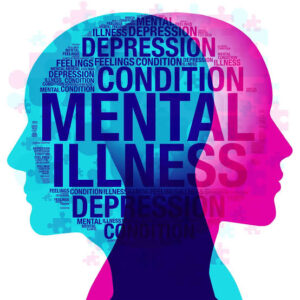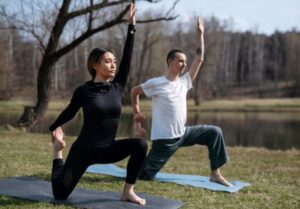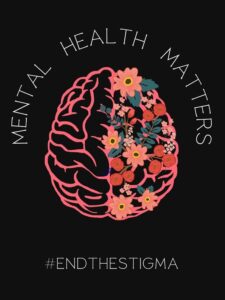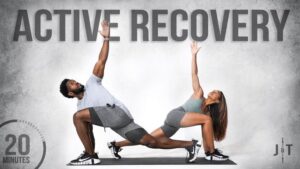Health and Fitness: 5 Habits for a Healthy Lifestyle

⇒ Introduction:
Nutrition and training are undoubtedly the two most important factors in everybody’s life. Thus, work capacity is defined as every human being’s ability to engage in physically active work provided that they are fit physically, mentally, nutritionally, and able to sleep adequately and recover actively. These gadgets have become very useful in modern life, where health and fitness are of utmost importance in reducing incidences of diseases as well as improving brain functioning.
⇒ Key Concepts and Definitions:
Physical Activity:
Any movement that one tends to expend energy and consequently improve on their general fitness level.

Balanced Nutrition:
A regular balanced diet means taking a number of foods in an appropriate amount to meet the recommended nutrients in the body.

Mental Health:
Stress and psychological health, which is a person’s capacity to deal with stress and his/her psychological health.

Sleep Hygiene:
This is referring to the positive behaviors that are associated with positive sleep outcomes; that is, people with excellent sleeping habits will sleep well frequently, have high-quality sleep, and vice versa.

Active Recovery:
As a form of use of muscles after putting them through rigorous activities through strength training, for instance.

⇒ Benefits and Advantages:
Regular physical activity:
It helps to strengthen muscles and improve the condition of the heart, mind, and energy levels. It also helps to control obesity and prevent diseases like heart disease and diabetes.
Balanced Nutrition:
Has beneficial effects towards the body’s proper functioning, blood circulation, muscle rebuilding, and boosting up of the immune system.
Mental Health:
Helps manage stress, anxiety, and depression together with enhancing one’s concentration and moods.
Adequate sleep:
It helps the patient recover and maintain a clear and healthy mind and does not allow the illness to worsen.
Active Recovery:
Reduces muscle soreness, prevents exercise injuries, and enhances the body’s healing after we exercise.
⇒ How-to or Guide:
1. Regular physical activity:
• How to start:
Starting with simple exercises like walking, jogging, and swimming to high-impact exercises. It is important to bear in mind that the levels of intensity should be gradually increased the more the fitness levels rise.
• Recommended frequency:
It is recommended to have at least 150–300 minutes of moderate aerobic activity or 75–150 minutes of vigorous aerobic activity per week and that strength training exercises should be done at least two times per week.

• Best practices:
Before any session of intensive exercise, warm up and always follow it with stretching to minimize your chances of pulling muscles.
2. Balanced Nutrition:
• How to maintain it:
Ensure you take products that contain a lot of fiber, such as whole-meal bread, proteins, vegetables, and foods that contain fats but are healthy for the body. Portion control should be of keen interest, as should the elimination or drastic reduction of processed foods and sugar products.

• Hydration tips:
It is recommended to take not less than 8 glasses of water per day and more during any type of movement.
3. Mental health:
• Mindfulness:
Exercise, do some yoga, deep breathing, or any other practice that will help reduce your level of stress. Though only a few minutes a day, it has been shown to reduce stress.

• Self-care:
Get up frequently, do some activities that one enjoys, and spend time with friends and loved ones to achieve emotional regulation.
4. Adequate Sleep:
• Sleep hygiene tips:
Perform different tasks at a regular time of the day, such as going to bed and waking up in the morning. Reduction in the amount of time spent on electronic devices before retiring to bed, use of eye masks and ear plugs, and use of warmer bedding.

• How much sleep:
Try to sleep for 7-9 hours during the night to enable your body to have enough rest.
5. Active recovery:
• How to implement:
On the rest days, one should engage in low-impact exercises like walking, performing yoga, or swimming with a view to improving the recovery process. Foam rolling and stretching can also come in handy.

• Benefits:
Exercise is beneficial to muscles due to its ability to foster muscle repair, enhance blood circulation, and ultimately encourage adequate mobility and flexibility of muscles.
⇒ Tips and best practices:
• Consistency:
Being disciplined towards such aspects as exercise, diet, and sleep is very important in weight loss.
• Goal setting:
Make achievable targets that relate to your fitness and/or health and monitor them.
• Listen to your body:
Work around the first signs of tiredness or signs of an injury and change the routine in line with the findings.
⇒ Common Mistakes or Pitfalls:
Overtraining:
If you overexert yourself without adequate rest, you are likely to cause injuries to your body. Ensure that you come for your routine workouts with days of rest in between to allow muscles to recover.
Skipping meals:
Do not drastically reduce the number of calories taken or miss meals because this can result in low nutrient intake and energy levels.
Neglecting mental health:
This implies that by disregarding stress and mental fatigue, one’s physical performance may be affected besides the likelihood of suffering a burnout.
⇒ Conclusion:
A healthy and fit life is the process of establishing sustainable healthy habits that contribute to the good health of the body and the mind. Essentials such as having exercise, a balanced diet, mental health practices, sleep, and active recovery can help one gain more energy, be less sickness-prone, and have better emotions. It is important to note here that the worst thing to do is to quit after a few days or weeks of exercising to achieve the right kind of body to fit a certain dress; it is advised that one should begin small, then progress from there to achieve the desired results.
⇒. Additional Resources:
-
Harvard Men’s Health Watch—America’s Exercise Phobia
link:https://www.health.harvard.edu/newsletters/Harvard_Mens_Health_Watch
2. Mayo Clinic: Diet and Eating Habits.
link:https://diet.mayoclinic.org/us/the-program/healthy-habits/
3. National Sleep Foundation—Sleep Hygiene:
link:https://www.sleepfoundation.org/sleep-hygiene
⇒ FAQs:
Q: How often should I exercise in order to get the best benefits of my exercises?
A: Adults should go for moderate exercise at least 150 minutes per week or 75minutes of vigorous exercise per week along with muscle strengthening exercises.
Q: What are the foods to include in balanced diet?
A: A balanced diet entails the right portion of the foods that are grouped into; whole grain products, lean meats, healthy fats, fruits and vegetables.
Q: Fitness is a convenient way of managing stress and people should ask themselves the following questions;
A: Another component of fitness regime is stress which can be minimized by doing exercises such as yoga or meditation.
Q: Is lack of sleep very dangerous for fitness?
A: Rest is very essential since it helps in rebuilding muscles, strengthening the brains and upgrading the whole-body health. Getting 7-9 hours of sleep every night is the ideal thing to do in order to keep healthy.
⇒ Forecast:
• Digital fitness:
There are many mobile applications and online training software hence making virtual fitness programs more common.
• Wearable technology:
Wearable which will assist people in tracking their health via monitoring of the pulse rate, the sleep quality, and the activity level will remain relevant.
• Holistic fitness:
Matters concerning mental and physical health will be interconnected; this indicates that many programs are likely to include both sections where the participants are trained on the right type of exercise and at the same time undergo special training on how to manage their minds.
⇒ Case Studies or Examples
1. John’s Weight Loss Journey:
Through the program John adopted daily walking and strength training, taking healthy diet comprising of vegetables and lean protein and facilitated the achievement of the objectives of losing 30 pounds in six months and enhancement of his cardiovascular health.
2. Sarah’s Stress Management Success:
One of the successful activisms was sarah working profession, she opted to practice yoga and mindfulness for 20 minutes a day due to high work stress and to increase focus among them.
Note:
If you have any question then comment on post we will response as soon as possible.
thank you all to visit our site to get new tips and incresce you knowlegde.by get new blog visit our site daily.
share this to your friends ;www.know-tips.com



